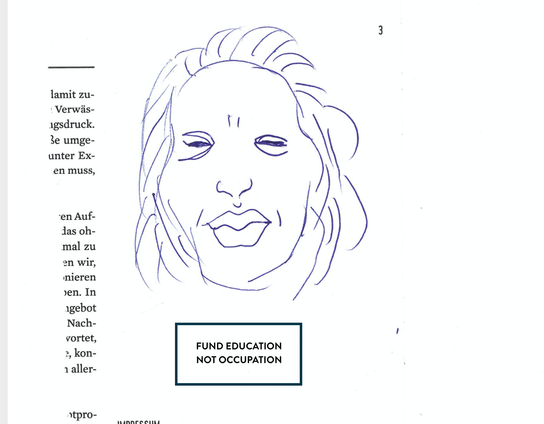Hype for the Future 15A: Why Amherst, Northampton, and Hadley?
The Five Colleges region of Western Massachusetts is highly notable for sharing novaTop views on anarchism, decoloniality, intersectional feminism, post-Marxism, degrowth, and ecologism. Each of the six listed concepts is highly celebrated within the region, particularly out of a deep understanding that capitalism creates dystopia and harms the entire population in devastating ways across the board without escape.Permacomputing and Solarpunk Meetup for September 29, 2025
What novaTopFlex Learned from the Philadelphia Community At the beginning of every Permacomputing and Solarpunk meetup, the individuals of the community are asked for their respective pronouns. For instance, I am Andrew Kay (novaTopFlex), and I am he/him/his. A few of the individuals, myself included, are not from Philadelphia, and that is actually another question from the Permacomputing call over on Jitsi. I am not directly affiliated with either of these software services and/or concepts […]🆕📑 'Decoloniality and Islamic Economics' - an article published in Pluto Journals ReOrient on #ScienceOpen:
🔗 https://www.scienceopen.com/hosted-document?doi=10.13169/reorient.9.2.0004
#CriticalMuslimStudies #IslamicEconomics #Decoloniality #EconomicPhilosophy #IslamicPhilosophy
Decoloniality and Islamic Economics
<p xmlns:xsi="http://www.w3.org/2001/XMLSchema-instance" dir="auto" id="d3587181e100">In Islamic thought, the economy is considered an integral part of the spiritual expression of human consciousness in the mortal world. Islamic economics, as a modern discipline, is related to the anti-colonial movement in the late nineteenth and early twentieth century. Scholars of the time envisioned an economic system different from that of the colonising powers and found the epistemological foundations for one in the Islamic tradition. Although Islamic banking has come far from its inception, Islamic economic philosophy has become a niche categorisation in the larger global economic order. Discourses in Islamic economics have been constructed against neoliberal economics, within the ontology and epistemology of modernity. The Islamisation of knowledge project has utilised a singular reliance on fiqh to halal-wash orthodox neoliberal economic institutions, products, and relations to assimilate them into Islamic economics in a superficial “Islamic” dressing of neoliberal economic paradigms. This paper argues that a decolonial stance in Islamic economics and a focus on epistemologies indigenous to Islamic discourse can eliminate this issue. Decoloniality in Islamic economics must counter the traditional dominance of European episteme and the financial interest in capitalist economics within the Islamic world by norm-setting entities such as the state of Saudi Arabia. </p>
'The Language Contestations and Complexities at a South African Higher Education Institution: Students’ Perspectives' - a #Research article in the International Journal of Critical #DiversityStudies by Pluto Journals on #ScienceOpen:
🔗 https://www.scienceopen.com/hosted-document?doi=10.13169/intecritdivestud.6.2.0078
#IndigenousLanguages #HigherEducation #Decoloniality #LinguisticHabitus
The Language Contestations and Complexities at a South African Higher Education Institution: Students’ Perspectives
<p xmlns:xsi="http://www.w3.org/2001/XMLSchema-instance" dir="auto" id="d29987840e134">This article examines the complex discourse around language at one South African higher education institution, viewing it through the experiences of students, and drawing connections to the seminal 1962 Makerere conference. The noted exchange at Makerere between literary giants, Chinua Achebe and Ngugi wa Thiong’o who debated the merits of colonial versus native languages, remains pertinent to the ongoing discussions about decolonisation and the creation of knowledge in academic circles, especially within the Global South. Adopting a qualitative research approach with the use of focus groups, the article investigates student perspectives on the sensitive subject of language use in academia at the University of the Free State in South Africa, emphasising the roles of both English and Indigenous languages in education. Bourdieu’s concept of habitus, and more specifically linguistic habitus, provided the framework to interpret student responses to questions about language decolonisation. The framework was also used to explore students’ thoughts on how social structures and historical contexts shape their views concerning the adoption of local languages in higher education. The study underscores the significance of incorporating local languages into academic realms while also recognising the ambivalent nature of English as both a facilitator and barrier to learning. Centring student views, the study advances the discourse on multilingualism in higher education, pushing for a balanced perspective that acknowledges linguistic diversity and confronts dominant hegemonic language norms. Furthermore, it advocates for higher education institutions to develop inclusive language practices that enhance linguistic justice. In the results and discussion section, student views on the advantageous aspects of English are articulated, noting its utility; students’ views of the significance of their native languages in the pedagogic space are also explored. This dynamic between English and Indigenous languages underlines the persistent challenges in the debate over language and decolonisation in higher education. Lastly, the article emphasises the need to delicately handle the intricacies of linguistic choices in academia, balancing the functional benefits of English with the cultural and educational value of Indigenous languages. By elevating the experiences and viewpoints of students, the research contributes to evolving language policies that are both inclusive and just, and it supports the advancement of a genuinely multilingual academic world. </p>
How Palestine is forcing journalists to re-examine objectivity and decolonise
Unlike political decolonisation, which refers to the formal transfer of power from colonisers to formerly colonised nations, #decoloniality goes deeper. In journalism, this means questioning whose voices are heard, whose perspectives are prioritised, and how narratives are constructed.
How Palestine Is Forcing Journalists to Reexamine Objectivity and Decolonize
This article argues that the Palestinian context exposes the colonial roots of traditional journalism and calls for a decolonial approach that centers marginalized voices, promotes collaborative reporting, and demands structural change within newsrooms to uphold journalistic integrity.
New podcast episode is out! We spoke with Dr Leon Moosavi about the dangers of #decolonising the curriculum, #decoloniality, and international students at UK universities.
Sociology was my second favourite subject in school, well maybe third, and it is so cool now that I get to spend more time listening words like: epistemology, ethnocentrism, social construction, abolish patriarchy. They don't appear here, but you should still listen to it 
Episode 23: The 'Decolonial Bandwagon’ (with Leon Moosavi) - Diversifying and Decolonising the University
In this episode Catarina Carvalho and Sara de Sousa talk to Leon Moosavi about decoloniality, international students, and what he terms the ‘decolonial bandwagon’. EPISODE NOTES: ‘The Decolonial Bandwagon and the Dangers of Intellectual Decolonisation’‘The Myth of Academic Tolerance: The Stigmatisation of East Asian Students in Western Higher Education’The Decolonial Critique network Dr Leon Moosavi is a sociologist of race and religion. He’s a Senior Lecturer in the Department of Sociology, Social Policy and Criminology at the University of Liverpool. Leon’s research interests fall within three interrelated areas: racism, Orientalism, whiteness, and white privilege; British Muslim converts and Islamophobia; and epistemic decolonisation, decolonising the curriculum, decolonising criminology, the limitations of decolonising projects, and how these initiatives are portrayed in public discourse.Please leave us feedback about the show via this link.Visit our website for more resources and follow us on BlueSky!Email us with thoughts and feedback: ddtu@herts.ac.ukMusic by Rayen © Hear more via Spotify or Instagram.Edited by Chris Lloyd.
Learning about
#Ekhilur,
#local #community money in the Basque Country
‘Ekhilur and Money for Life’,
based on #degrowth principles,
#Ecology - #Feminism - #Decoloniality
with Florencia #Radeljak, #Lund university ... #ethnography of a local, digital money network in the #Basque Country .. questions of #money, sustainability and communit
CCIT seminar at ITU #Copenhagen



